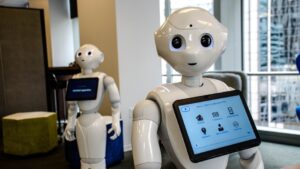 In the previous blog, we witnessed how robotics has proven to be a boon for the healthcare industry. The emergence of robotics in healthcare has resulted in an enhanced healthcare system by making complex surgeries, patient screening, and disinfecting hospital areas much simpler.
In the previous blog, we witnessed how robotics has proven to be a boon for the healthcare industry. The emergence of robotics in healthcare has resulted in an enhanced healthcare system by making complex surgeries, patient screening, and disinfecting hospital areas much simpler.
Continuing from the previous list of robotics applications in healthcare, we shall look at four more ways robotics shall impact our health from now on. Read on!
Microbots for disease detection
We have seen how giant metal robots help assist with surgeries, but the scope of robotics goes way beyond that. Microbots, small-sized robots, have a mighty significance in the healthcare industry.
They enable doctors to perform a Capsule Endoscopy procedure; the patient is required to swallow a capsule. The camera embedded in the capsule takes colored photos as it passes down the digestive tract and allows the doctor to check for abnormalities within the body.
It can help find the cause of gastrointestinal bleeding, diagnose cancer and celiac disease, and examine your esophagus.
Chatbots for assistance
Today, chatbots are becoming popular in every sector, including healthcare. There are countless ways in which they can be helpful to doctors, nurses, and patients.
They can be used to connect patients with physicians for diagnosis and treatment. Soon, there is a distinct possibility that people will first turn to these chatbots for medical assistance and health-related questions. If they can’t solve the problem, it will transfer the case to a real-life doctor. Moreover, chatbots may someday show human-like traits such as care and empathy. Just like a psychologist, they will listen to your problems and even counsel you in return!
Robots for Drug Development
Robots are helping us in the forefront and are also deployed in drug development and research of medicines. Industrial robots are widely used in the pharmaceutical supply chain for assembly, quality inspection, and packaging. Pharma companies use robots to automate various processes required for drug development.
With the help of robots, companies can conduct faster medical trials for patients, meet the increasing demand for medicines, and maximize production efficiency. Also, the use of robots minimizes the risk of human contamination, which is a critical factor.
Robots for therapeutic massages
Robots can even relieve body pain by providing therapeutic massages soon. They shall be used, especially in sports injury rehabilitation and pain management, and prove extremely useful for athletes. They are capable of highly articulated movements and have advanced pressure sensors for the total comfort of patients.
The scope of robotics in healthcare has gone beyond one’s imagination in the past 15 years. It will continue to create headlines in the coming years. We, at Yantra, specialize in indigenous designing and development and manufacturing of standard and tailor-made mobile robotic systems. During the initial stages of the pandemic, we felt we needed to contribute using our knowledge and expertise; thus, we developed a robot aimed explicitly at helping hospitals manage the pandemic better. Check out how Yantra’s robot, Vighnaharta, helps a hospital manage the cleaning and transport of material ( https://youtu.be/Sn8e_ZCTMFQ). We shall continue to develop robots that help various industries automate their tasks and improve performances.
Stay tuned to our Knowledge Corner as we assess the risks and rewards of deploying robotics in the healthcare industry.




